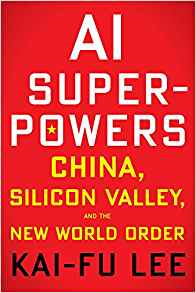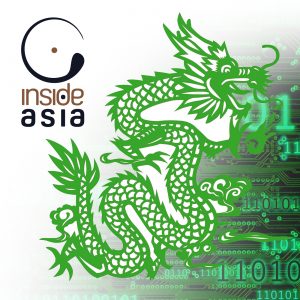Featured Event
AI Superpowers
Sept. 28 evening
St. Francis Yacht Club
San Francisco
for best pricing
(your
ticket includes AI Superpowers book,
out just in time
for our event!)
Fireside chat
with
Author & VC
Kai-Fu Lee,
Sinovation Ventures
Panel of
leading VCs investing
in AI
+
Network reception
overlooking the Bay
 ... ...
|
|
Silicon Dragon
Annual Awards
Top VC, Founder, Deal and Startup
Hong Kong
Nov. 15, 5-9pm
Thanks to our sponsors
Morrison & Foerster
KPMG
PARTNER EVENT
Competing and
Collaborating
with an
Innovative China
Sept. 27
10% discount:
enter code SD

CKGSB Program
at University Club
New York City
Speaking
appearances
Cyberport Venture Forum
Hong Kong
November 8
|
| 
Subscribe To
Silicon Dragon News
Follow
@silicondragon
@rfannin
|
|
|
| |
 A next generation of Chinese tech companies continue to flock to the U.S. for IPOs, the U.S-China trade war aside. At the current rate of activity, the year 2018 could be the biggest year for Chinese IPOs in New York in several years.
A next generation of Chinese tech companies continue to flock to the U.S. for IPOs, the U.S-China trade war aside. At the current rate of activity, the year 2018 could be the biggest year for Chinese IPOs in New York in several years.
This IPO boom underscores another major trend: a softening of China venture capital for Chinese startups. China's emerging companies are going public to raise cash as it become more difficult to raise venture funding, particularly at the higher valuations they've grown accustomed to as unicorn-financed hotshots.
This year, Nasdaq has attracted 12 Chinese companies that raised $4.9 billion with a combined market valuation of $47 billion in 2018. The NYSE has 6 Chinese IPO in its 2018 tally.
Two of the most prominent Chinese listers in the U.S. this year were hot-shot China social commerce company
Pinduoduo and
Baidu's spun off livestreaming service
iQIYI. Pinduoduo raised $1.6 billion in late July while iQIYI topped out with a $2.2 billion initial public offering in March.
U.S.-China Deal Friction Takes Toll
Here's at the heart of the friction over U.S.-China tech investments. Chinese companies have been investing in America's crown jewel tech startups and emerging companies for several years. Meantime, U.S. business and tech executives complain that China strong-arms them into sharing technologies in exchange for market access.
Now, let's look at the data. Chinese companies far outweigh U.S. companies when it comes to U.S.-China, two-way foreign direct investment. In 2017, U.S. companies invested $14 billion in Chinese companies -- almost unchanged from the previous year and fairly steady since 2000, according to the Rhodium Group. Meanwhile, China has been on a buying spree in the U.S. since 2000, topping out at $41 billion in 2016 before tighter controls and crackdowns on China to U.S investment pruned the figure to $29 billion in 2017.
Consider too: From 2013 to 2017, Chinese tech investments globally soared to $310 billion, with Asia as the primary target followed by the U.S., research from Standard & Poor's research division Capital IQ shows.
In the U.S., China's big three companies (the BAT or
Baidu,
Alibaba and
Tencent) have dominated these overseas acquisitions as they build out their core businesses to compete more aggressively. During the five years ending 2017, the BAT inked 95 U.S. tech deals at $27.6 billion, nearly two-thirds of the total $44.6 billion that China invested in U.S. tech companies during that period.
Baidu, Alibaba and Tencent have put stakes into America's most prominent startups,
Uber and
Lyft included. A new generation of BAT companies, specifically
Toutiao, are also taking aim at American tech upstarts.
Both China and the U.S. are dealing with increasing investment restrictions. Stay tuned.
CreditEase FinTech Investment Fund, a a venture fund owned by Chinese fintech firm CreditEase, has led a $62 million series C round in Upgrade, Inc., a San Francisco-based online lending start-up.
RootPath, a biotechnology startup in Cambridge, Mass. developing a personalized T cell therapy platform that bridges precision medicine and cancer immunotherapy, has closed a $7 million seed funding round led by Sequoia China with participation from Volcanics Venture, BV (Baidu Ventures) and Nest.Bio Ventures.
 Is China Tech at a crossroads? That's the question circulating around investor circles in recent weeks. There appear to be short-term (US-China trade), medium-term (Chinese regulatory), and long-term (scale & innovation) challenges confronting the China tech sector, and some concern that at China's big-brand tech plays are facing a period of slowdown and consolidation. Is China Tech at a crossroads? That's the question circulating around investor circles in recent weeks. There appear to be short-term (US-China trade), medium-term (Chinese regulatory), and long-term (scale & innovation) challenges confronting the China tech sector, and some concern that at China's big-brand tech plays are facing a period of slowdown and consolidation.
Steve Stine, Senior Regional Leadership Advisor and INSIDE ASIA radio talk show host, interviewed Silicon Dragon's Rebecca Fannin for a view on China's history and prospects.
FUNDS
Sequoia Capital India has wrapped up a $695 million sixth fund to chase bets in India and Southeast Asia, the next China opportunity. The latest fund makes Sequoia the largest in India, with total assets under management at $3.9 billion, ahead of SAIF.
Palace Intrigue Straight from China

Baidu's spun-off online entertainment service
iQIYI, recently listed on Nasdaq, has a smash hit in China with its highly popular drama "The Story of Yanxi Palace." The 70 episode drama series featuring
a Qing dynasty tale of scheming concubines and palace intrigue was streamed over 15 billion times in China
. The show has also proved immensely popular outside Asia, becoming one of the most watched licensed Chinese language dramas on
Youtube this year. This is part of China's build up of its own Hollywood and rise of livestreaming.
The Economist takes a look at Google's secretive plans for a return to China, with a mobile app that would censor search results that the government does not want its citizens to see. Even if the search engine were to gain the approval of China's government, it is not certain that it would win that of Chinese users.
|
|
|